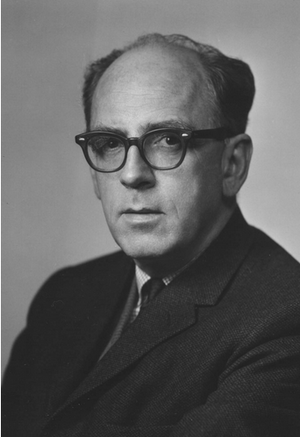Douglas LePan
( poet, diplomat, novelist, academic) | ||||||||||||
|---|---|---|---|---|---|---|---|---|---|---|---|---|
 | ||||||||||||
| Born | 25 May 1914 | |||||||||||
| Died | 27 November 1998 (Age 84) | |||||||||||
| Nationality | Canadian | |||||||||||
| Alma mater | • University of Toronto • Harvard • Merton College (Oxford) | |||||||||||
| Children | Don LePan | |||||||||||
| Spouse | Sarah Katharine Chambers | |||||||||||
Canadian university administrator who had to deal with political student unrest. He attended Bilderberg/1970, where one of the subjects was "Future Function of the University In Our Society".
| ||||||||||||
Douglas Valentine LePan was a Canadian diplomat, poet, novelist and university administrator who had to deal with political student unrest. He attended Bilderberg/1970, where one of the subjects was "Future Function of the University In Our Society".[1]
It wasn't a North American phenomenon only. It was a phenomenon that was to be found throughout the whole of the Western world. If I might interject one little illustration at a speech that I gave to the University College alumni towards the end of my period as principal in an effort to try to make them realize how widespread, how pervasive and how deep this movement was, I explained that it was a movement that had almost brought General de Gaulle to his knees.
In the lecture that I referred to, I tried to relate this movement of student unrest in Canada to the great failure of respect for power that had occurred throughout most of the Western world. And I suggested that that eclipse of respect for power was to be associated, first of all, with the rapidity of change and with a number of things that that had brought in its wake, and also with the way that power had been debased by the way it had been used in nuclear explosions.
I came to a few conclusions about it in its manifestations in Canada and in the University of Toronto that perhaps I might disclose. I had the feeling that the leaders of the student protest movement could be divided roughly into two categories, and I confess I had more sympathy with one category than with the other. The two categories I'm thinking of were those who are making their first bid for political power and who would end up in powerful positions as leaders of political parties or of trade unions or of businesses. They were riding this wave for their own purpose and for their own advantage. I don't mean to say that they were altogether insincere. Far from that, but as I ultimately analyzed what they were after, it was for positions of later and continuing power. In the other category, I would put those who, in my opinion, were rather more deeply sincere, many of whom were to end up virtually in the gutter. And for them, my sympathy goes out now and went out then in a much more real way. (1982)[2]
Education
Born in Toronto, Ontario, LePan was educated at the University of Toronto, at Harvard, and at Merton College, Oxford.[3]
Career
He taught English literature at the University of Toronto and Harvard between 1937 and 1941.
During the Second World War, he was on staff at the Canadian High Commission in London and then served in the Canadian Army as an artilleryman[3] during the Italian campaign. He joined the Canadian diplomatic service in 1946, and during his years as a diplomat served in London (as special assistant to Lester Pearson in the late 1940s) and in Washington, as well as in Ottawa. He was formally in the employ of the Department of External Affairs until 1959, though for several years during that time he was seconded by the Department of Finance to serve as Secretary for the Royal Commission on Canada's Economic Prospects (the "Gordon Commission"); his work drafting the multi-volume Report of the commission was widely praised.
LePan left the diplomatic service in 1959 to return to academic life; he taught at Queen's University from 1959-1964, and at the University of Toronto, where he was Principal of University College (1964–1970)[3] and then University Professor and Senior Fellow at Massey College.
Family
LePan had married, in 1948 to the former Sarah Katharine Chambers;[3] the two remained together until 1971, but the marriage was a difficult one, not least of all over issues relating to sexual orientation. The couple had two children; Nicholas Le Pan, the elder of the two, was for many years a senior civil servant in Canada's Department of Finance and served from 2001 to 2006 as Superintendent of Financial Institutions, while the younger, Don LePan, is founder and CEO of academic publishing house Broadview Press and the author of several novels.
Event Participated in
| Event | Start | End | Location(s) | Description |
|---|---|---|---|---|
| Bilderberg/1970 | 17 April 1970 | 19 April 1970 | Switzerland Hotel Quellenhof Bad Ragaz | the 19th Bilderberg meeting, in Switzerland. |
References
- ↑ https://discoverarchives.library.utoronto.ca/index.php/lepan-douglas-valentine-oral-history
- ↑ https://play.library.utoronto.ca/play/b4cce6f6d6f8342f81261fe9a170b35f
- ↑ a b c d Levens, R.G.C., ed. (1964). Merton College Register 1900-1964. Oxford: Basil Blackwell. p. 266.